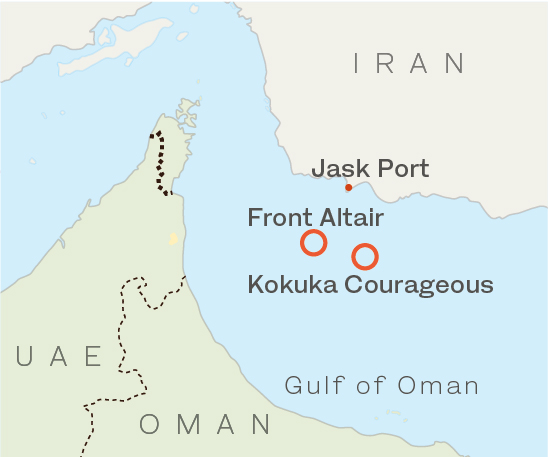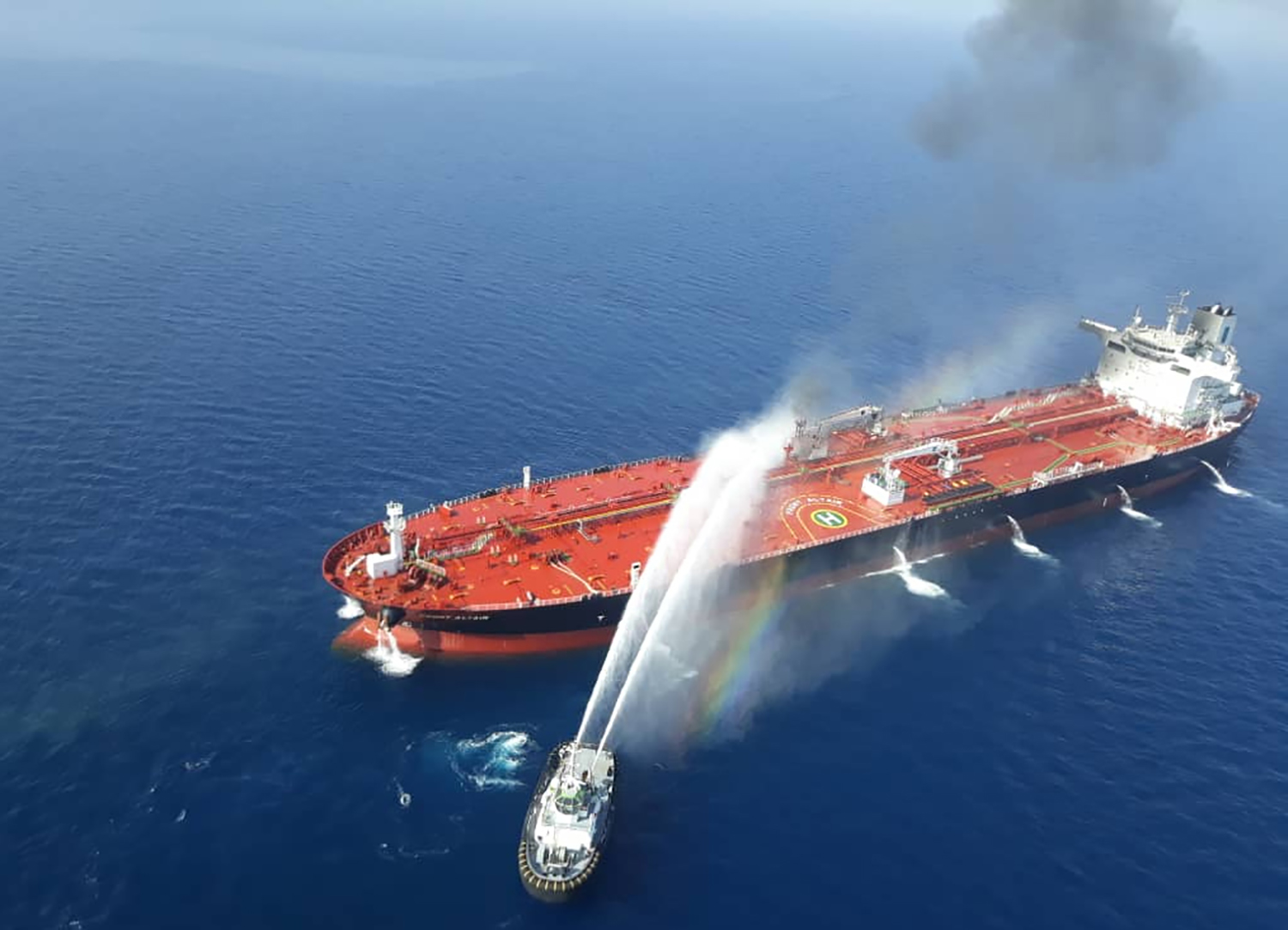DUBAI: Two oil tankers were attacked in the Gulf of Oman Thursday, leaving one ablaze and both adrift.
The attacks sent oil prices up by more than 3 percent by mid-afternoon over worries about Middle East supplies. They come at a time of heightened tensions over Iran’s activities in the region and after Tehran has repeatedly threatened to disrupt shipping in and out of the Arabian Gulf.
Thursday’s attacks took place to the east of the Strait of Hormuz, a major strategic waterway for world oil supplies, that leads into the Arabian Gulf.
The first ship, the Front Altair was on fire in between the coast of Iran and the UAE after an explosion. The Norwegian owner said its crew were safe.
A second Japanese-owned tanker, the Kokuka Courageous, was abandoned after being hit by a suspected torpedo, the firm that chartered the ship said. The crew were also picked up.
Bernhard Schulte Ship management said the hull of the Kokuka Courageous was breached above the water line while transporting methanol from Jubail in Saudi Arabia to Singapore. It said the ship was afloat and the crew safe with one minor injury reported.
A shipping broker said the blast that struck the Kokuka Courageous might have been caused by a magnetic mine. Japan’s Kokuka Sangyo, owner of the Kokuka Courageous, said its ship was hit twice over a three-hour period.

Taiwan’s state oil refiner CPC said the Front Altair, owned by Norway's Frontline, was “suspected of being hit by a torpedo” around 4 a.m. GMT, as it carried 75,000 tonnes of the petrochemical feedstock naphtha to Taiwan.
Frontline said its vessel was on fire but afloat, denying a report by the Iranian news agency IRNA that the vessel had sunk.
The Bahrain-based US Navy Fifth Fleet said it was assisting the two tankers after receiving distress calls.
TV images showed huge, thick plumes of smoke and fire billowing from one of the tankers as it lay out to sea.
The master of the Front Altair ordered the 23-member crew to abandon ship after a blast, International Tanker Management, the technical manager of the vessel, said. It said the crew were picked up by the nearby Hyundai Dubai.
The Front Altair loaded its cargo from Ruwais in the UAE, according to trade sources and shipping data on Refinitiv Eikon.
Iran’s IRNA reported that Iranian search and rescue teams had picked up 44 sailors from two damaged tankers and had taken them to the Iranian port of Jask. That report could not immediately be confirmed.
Ship tracking websites showed the two ships halting their course early Thursday after they had passed through the Strait of Hormuz.
The Front Altair performed a hard turn to starboard just before 3 a.m. GMT and turning full circle. The Kokuka Courageous changed course after 7 a.m. GMT
Tensions have risen in the Gulf since an Iranian threat prompted the US last month to deploy an aircraft carrier strike group and B-52 bombers to the region.

Teams putting out a fire on board an oil tanker attacked in the Gulf of Oman. (AFP)
Within days of the announcement, four ships were attacked with limpet mines while moored off the UAE coast. Saudi Arabia and the US blamed the incident on Iran.
On Wednesday, a missile fired by Yemen-based Houthi militants, which are supported by Iran, struck Saudi Arabia’s Abha airport, injuring 26. The Houthis also claimed an armed drone strike last month on Saudi oil pumping stations.
President Donald Trump, who has demanded Tehran curb its military programmes and influence in the Middle East, pulled the United States out of a deal between Iran and global powers to curb Tehran's nuclear ambitions.
In recent months, the US has used punishing sanctions to reduce Iran’s oil exports to a trickle. Saudi Arabia and other oil producers in the region have increased production to fill the void and keep prices on track.
Thursday’s attacks prompted strong international condemnation and deep concern of the impact on shipping in an area which carries so much of the world’s oil supply.
“We need to remember that some 30 percent of the world’s (seaborne) crude oil passes through the Straits. If the waters are becoming unsafe, the supply to the entire Western world could be at risk,” said Paolo d’Amico, chairman of INTERTANKO tanker association.
--------
READ MORE
Two tanker owners suspend Gulf bookings as tension now ‘as high as it gets’
US blames Iran for Gulf of Oman tanker attacks
--------
Arab League Secretary-General Ahmed Aboul Gheit called on the U.N. Security Council to act against those responsible to maintain security in the Gulf region.
"Some parties in the region are trying to instigate fires in the region and we must be aware of that," he told the 15-member council, without specifically naming anyone.
The White House said Donald Trump had been briefed on the incident and Britain said it was “deeply concerned.”
United Nations Secretary-General Antinio Guterres strongly condemned the attacks and warned that the world cannot afford a major confrontation in the Gulf.
The European Union called for "maximum restraint" to avoid an escalation in the region.
Iranian Foreign Minister Mohammad Javad Zarif described the incidents as “suspicious” on Twitter, noting that they occurred during Japanese Prime Minister Shinzo Abe's visit to Tehran.
Russian Deputy Foreign Minister Sergei Ryabkov said people should not rush to blame Iran. Abe’s trip was designed to seek to defuse tensions with the US.
Analysts said the severity of the attacks was a marked escalation compared to the incident in Fujairah in May.
“Security will no doubt be beefed up, but it will have to be extended further if there is any repetition of such an attack,” Robin Mills, CEO of consultancy Qamar Energy, told Arab News. “This goes considerably … beyond the last Fujairah attacks.”
Within hours of the attacks, at least two oil-tanker owners — DHT Holdings and Heidmar — said they had suspended new bookings to the Gulf, Reuters reported.
Shipping association BIMCO, which represents some 60 percent of the world’s merchant fleet, urged its members to “exercise extreme caution” in the area.
“The tension in the Strait of Hormuz and the Arabian Gulf is now as high as it gets without being an actual armed conflict,” Peter Sand, chief shipping analyst at BIMCO, told Arab News.
“(We advise) our members to exercise extreme caution and instruct their vessels to take precautions … when operating in the area. Depending on the risk acceptance levels of the company, and to the extent operations allow, it could be considered to instruct ships to avoid the area or keep as much distance as possible.”
Sand said it was understandable that some shipping companies had stopped bookings to the area but doubted whether others will follow.
*With Agencies



















